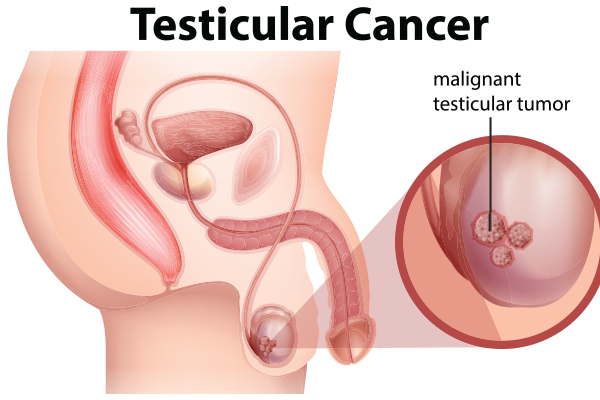
Testicular cancer is one of the most common cancers among young men yet it remains widely misunderstood. While it is a relatively rare cancer, early detection and treatment significantly improve outcomes. In this blog, we explore the causes, symptoms, risk factors, and treatment options for testicular cancer, along with prevention strategies and frequently asked questions.
Synopsis
- What Are the Causes of Testicular Cancer?
- What Are the Symptoms of Testicular Cancer?
- Who Is at Risk for Testicular Cancer?
- Stages of Testicular Cancer
- Treatment Options for Testicular Cancer
- Lifestyle and Recovery Post-Treatment
- Preventive Measures Beyond Risk Factors
- Common Myths and Facts About Testicular Cancer
- Conclusion

What Are the Causes of Testicular Cancer?
The exact cause of testicular cancer is still unknown. However, research suggests that certain genetic and environmental factors may contribute to its development. Cancer occurs when healthy cells in the testicles mutate and grow uncontrollably, forming a tumour.
Key Factors That May Contribute to Testicular Cancer:
-
Genetic Mutations – Some inherited mutations may predispose individuals to testicular cancer.
-
Hormonal Imbalances – Abnormal testosterone levels may play a role in cancer development.
-
Cell Abnormalities – Certain precancerous conditions, such as intratubular germ cell neoplasia (ITGCN), increase the risk of testicular cancer.
What Are the Symptoms of Testicular Cancer?
Early detection is crucial for effective treatment. Men should be aware of the following symptoms:
| Symptom | Description |
| Painless lump or swelling | A small lump or increased size in the testicle |
| Heaviness in the scrotum | A dragging sensation in the lower abdomen or groin |
| Sudden fluid buildup | Rapid accumulation of fluid in the scrotum |
| Pain or discomfort | Can occur in a testicle or the entire scrotum |
| Breast enlargement | Hormonal changes can lead to gynecomastia |
If any of these symptoms persist, consulting an ocncologist promptly is essential.
Who Is at Risk for Testicular Cancer?
Understanding the risk factors can help in early detection and prevention. Here are the key risk factors:
- Age
Testicular cancer primarily affects men between the ages of 15 and 35, though it can occur at any age.
- Family History
Men with a close relative (father or brother) who had testicular cancer have a higher risk.
- Undescended Testicle (Cryptorchidism)
Men born with an undescended testicle are more likely to develop testicular cancer, even if surgery is performed to correct it.
- Previous Testicular Cancer
If a person has had testicular cancer in one testicle, they are at a higher risk of developing it in the other.
- Abnormal Testicular Development
Conditions such as Klinefelter syndrome can increase the risk of testicular cancer.
Stages of Testicular Cancer
Testicular cancer is classified into different stages based on how far it has spread.
| Stage | Description |
| Stage 0 | Abnormal cells are present but haven’t spread. |
| Stage 1 | Cancer is confined to the testicle. |
| Stage 2 | Cancer has spread to lymph nodes in the abdomen. |
| Stage 3 | Cancer has metastasised to distant organs, such as the lungs or liver. |
Treatment Options for Testicular Cancer
Testicular cancer is highly treatable, even in advanced stages. Here are the primary treatment methods:
1. Surgery
-
Radical Orchiectomy: Removal of the affected testicle; often the first-line treatment.
-
Retroperitoneal Lymph Node Dissection (RPLND): Removes lymph nodes if the cancer has spread.
2. Chemotherapy
-
Used for advanced testicular cancer.
-
Side effects may include nausea, hair loss, fatigue, and nerve damage.
-
High success rates, with most patients achieving remission.
3. Radiation Therapy
-
Often used for seminoma-type testicular cancer.
-
Targets lymph nodes to prevent recurrence.
Lifestyle and Recovery Post-Treatment
Recovering from testicular cancer involves both physical and emotional adjustments.
-
Fertility Considerations: Sperm banking is an option before treatment.
-
Regular Follow-ups: Essential to monitor recurrence.
-
Healthy Diet & Exercise: Improves overall well-being.
-
Emotional Support: Counselling and support groups can help cope with psychological challenges.
Preventive Measures Beyond Risk Factors
While not all cases are preventable, certain practices can help with early detection:
1. Monthly Self-Examinations
-
Best performed after a warm shower.
-
Roll each testicle between the fingers to check for lumps or changes.
2. Regular Health Checkups
- Routine screenings help in early detection.
3. Maintaining a Healthy Lifestyle
- Avoid excessive alcohol and smoking, which may contribute to cancer risk.
Common Myths and Facts About Testicular Cancer
Myth: Only older men get testicular cancer.
Fact: It is most common in younger men (15-35 years old).
Myth: Testicular cancer is always fatal.
Fact: It has a high survival rate, especially when detected early.
Conclusion
Testicular cancer is a serious but highly treatable disease. Awareness, regular self-examinations, and prompt medical attention can lead to early diagnosis and successful treatment. If you notice any symptoms, consult a healthcare professional immediately. Prioritising men’s health can save lives!
For more expert medical guidance, visit Manipal Hospitals Delhi and explore world-class treatment options.
FAQ's
While most cases are sporadic, having a close relative with testicular cancer increases risk.
No, treatment depends on the stage. Early-stage cancer may only require surgery.
Yes, though rare, testicular cancer can occur in children and men over 50.
Men should perform monthly self-exams to check for lumps or changes
The 5-year survival rate for localised testicular cancer is over 95%.



















 4 Min Read
4 Min Read














